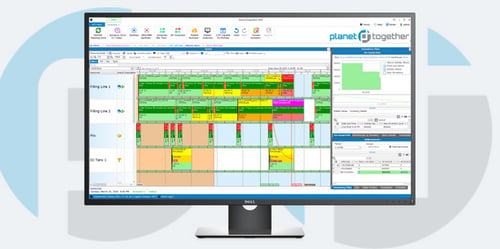Topics: Make to Stock, make to order, PlanetTogether Software, Integrating PlanetTogether, Seamless Data Flow, Optimized Scheduling, Just-In-Time (JIT) manufacturing, Medical Manufacturing

In medical manufacturing, production schedulers are at the heart of balancing efficiency, compliance, and responsiveness. The evolving landscape of manufacturing strategies has led to the rise of hybrid production models, a strategic blend of make-to-stock (MTS), make-to-order (MTO), and just-in-time (JIT) methodologies. These models offer greater flexibility and efficiency, ensuring that manufacturers can meet stringent regulatory requirements while responding to fluctuating market demands.
However, implementing a hybrid production model is not without challenges. The complexity of coordinating different workflows, minimizing downtime, and optimizing resource utilization requires a robust production scheduling solution. This is where integrating PlanetTogether with enterprise systems like SAP, Oracle, Microsoft, Kinaxis, or Aveva becomes a game-changer.

A hybrid production model integrates elements from multiple manufacturing strategies to maximize efficiency and responsiveness. In medical manufacturing, where demand patterns can be highly variable and product lifecycles are often dictated by regulatory approvals, this approach is essential.
Make-to-Stock (MTS)
Ensures critical medical products are always available, preventing shortages of essential items like syringes or diagnostic kits.
Make-to-Order (MTO)
Allows for customization in specialized medical devices and implants, reducing inventory waste.
Just-in-Time (JIT)
Minimizes holding costs and enhances agility in responding to demand surges, particularly in crisis situations such as pandemics.
Engineer-to-Order (ETO)
Ideal for custom medical equipment that requires design and engineering before production.
By blending these approaches, medical manufacturers can optimize production schedules, reduce costs, and maintain regulatory compliance.

For a Production Scheduler, navigating a hybrid production model requires an intelligent and dynamic scheduling system. Traditional scheduling tools or spreadsheets lack the real-time visibility and optimization capabilities needed for modern medical manufacturing. This is where integrating PlanetTogether with ERP solutions like SAP, Oracle, Microsoft, Kinaxis, or Aveva becomes crucial.
Seamless Data Flow
Integration ensures real-time synchronization of demand forecasts, material availability, and production schedules across different departments.
Optimized Scheduling
PlanetTogether’s advanced algorithms analyze constraints such as labor availability, machine capacity, and material lead times to generate optimal schedules.
Regulatory Compliance
In medical manufacturing, traceability is non-negotiable. PlanetTogether’s integration with ERP systems ensures that all processes are logged, making audits and compliance reporting seamless.
Scalability and Flexibility
As production demands fluctuate, integrated scheduling systems allow for quick adjustments to accommodate urgent orders or unexpected supply chain disruptions.
While the benefits of hybrid production models are significant, there are challenges to address:
Complexity in Scheduling
A hybrid model means juggling different workflows simultaneously. Solution: Leveraging AI-driven scheduling algorithms in PlanetTogether allows schedulers to quickly adjust production plans based on changing demand patterns.
Supply Chain Disruptions
Fluctuations in raw material availability can disrupt production timelines. Solution: Integrating with Kinaxis enables real-time supply chain visibility, allowing proactive adjustments to scheduling.
Regulatory Compliance
Medical manufacturing is heavily regulated, requiring meticulous documentation. Solution: With PlanetTogether and Oracle integration, every step of the production process is tracked and documented, ensuring full compliance with FDA and ISO regulations.
Workforce and Machine Constraints
Hybrid models often require precise labor and machine allocation. Solution: Microsoft’s ERP solutions, when combined with PlanetTogether, provide automated workforce planning and predictive maintenance insights, preventing unexpected downtimes.
Hybrid production models are the future of medical manufacturing, providing the flexibility, efficiency, and responsiveness required in today’s complex environment. However, to maximize the benefits, seamless integration between scheduling tools like PlanetTogether and ERP systems such as SAP, Oracle, Microsoft, Kinaxis, or Aveva is essential.
For Production Schedulers, embracing these integrations means better decision-making, improved resource utilization, and enhanced compliance. As medical manufacturing continues to innovate, leveraging advanced scheduling and ERP integration will be the key to staying ahead in a highly competitive industry.
Are you ready to take your manufacturing operations to the next level? Contact us today to learn more about how PlanetTogether can help you achieve your goals and drive success in your industry.
Topics: Make to Stock, make to order, PlanetTogether Software, Integrating PlanetTogether, Seamless Data Flow, Optimized Scheduling, Just-In-Time (JIT) manufacturing, Medical Manufacturing
0 Comments







LEAVE A COMMENT